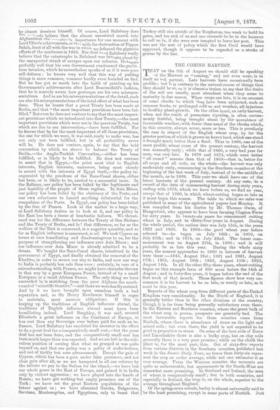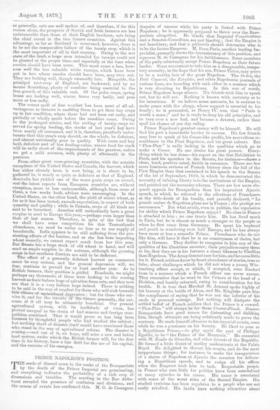THE COMING HARVEST.
THAT on the 9th of August we should still be speaking • ef the Harvest as "coming," and not even near, is in itself an e-ril portent. Late harvests have occasionally been prolific ; but is contrary to the natural course of things that they should be so, tko it is almost a truism to say that the fruits of the soil are usualIy most abundant when they come to maturity in due season. When crops are late, it is on account of some checks to which they have been subjected, such as summer frosts, or prolonged cold 'or wet weather, all injurious to healthy plant-growth, On the other hand, an early harvest, when not the result of premature ripening, is often uncom- monly fruitful, being brought about by the prevalence of favourable weather, with fewer than usual of the checks which, in this country, always occur, more or less. This is peculiarly the case in respect of the English wheat crop, by far the greater portion of which is grown on heavy land, which oan stand a drought much better than a flood. Thus in 1868, one of the most prolific wheat years of the present century, the harvest was unusually early ; while that of 1860, a very bad year for corn, was very late. In 1870 and 1874, which were better "all round" seasons than that of 1868—that is, better for all crops and all soils, on the whole—the harvest was only moderately early, commencing in the Southern counties at the beginning of the last week of July, instead of in the -middle of the month, as in 1808. This year we shall have one of the latest harvests of the present century. At any rate, in a record of the date of commencing harvest during sixty years, ending with 1878, which we have before us, we find no year, except that of 1860, in which wheat-cutting began so late as it must begin this season. The table to which we refer was published in some of the agricultural papers last Monday. It was compiled from his diaries by Mr. Thomas Owen, of Hungerford, who appears to have been farming Clapton Perm for sixty years. In twenty-six years he commenced cutting wheat in July, and in thirty-four years in August. During the whole period, the earliest date was July 15th, in the years 1822 and 1826. In 1868—the good wheat year before referred to—he began on July 16th; in 1870, on July 25th ; and in 1874, on July 22nd. The latest com- mencement was on August 27th, in 1860; and it will probably be as late this year. During the whole sixty years, the nearest approaches to 1860 in lateness of harvest were these :-1845, August 21st; 1821 and 1841, August 17th; 1855, August 16th; 1843, August 15th; 1823, August 14th. In all the other fifty-three years, wheat-cutting began on this example farm of 600 acres before the 14th of August ; and in fortr-Rve years, it began before the end of the first week of that month. These -figures show how very un- common it is for harvest to be so late, or nearly so late, as it must be this year.
Reports of the wheat crop from different parts of the United Kingdom vary considerably. In the North of England, it is generally better than in the other divisions of the country, though it is far from being generally satisfactory even there. In the Eastern and Southern counties, where the great bulk of the wheat crop is grown, prospects are generally bad. The most favourable reports for these counties come from Norfolk, where there is abundance of straw on the light and mixed soils ; but even there, the yield is not expected to be good in proportion to straw. On some of the best soils of Essex and Lineolnellire there is also a bulky crop, but on clay soils generally there is a very poor promise ; while on the chalk the plant is, for the most part, thin. Out of sixty-five reports
from various districts in the Southern counties, published last week in the Sussex Daily News, no fewer than forty-six repre-
sent the crop as under average, while not one estimates it as over average. From the Western counties the accounts are quite as unfavourable, but appearances in the South-West are
somewhat more promising. In Scotland and Ireland, the area of wheat is comparatively small ; but in both countries, and especially in Ireland, the crop is, on the whole, superior to the average throughout England.
Of the spring-sown cereals, barley is almost universally said to be the least promising, except in some parts of Norfolk. Just as generally, oats are well spoken of, and therefore, if for this reason alone, the prospects of Scotch and Irish farmers are less unfavourable than those of their English brethren, oats being the chief cereal in the two former countries. Against this advantage, as far as Scotland is concerned, however, there is to be set the comparative failure of the turnip crop, which is the most important of all in that country. Owing to the wet state of the land, a large area intended for turnips could not be planted at the proper time, and especially at the time when swedes should have been sown. This must cause a loss, how- ever well the less valuable white turnips, which have been put in late where swedes should have been, may turn out. They are looking well, though unusually late. Mangolds, the principal root-crop of England, are backward, and by no means flourishing, plenty of sunshine being essential to the free growth of this valuable root. Of tho pulse crops, spring beans aro looking well, winter beans very badly, and peas more or less sadly. The recent spell of line weather has been most of all ad- vantageous to farmers in enabling them to get their hay crops up in fair condition, where these had not been cut early, and partially or wholly spoilt before the sunshine came. Owing to the prolonged winter, and the rotting of turnip crops re- served for spring feeding, the stocks of last year's hay have been nearly all consumed, and it is, therefore, peculiarly unfor- tunate that this year's crop should, on the whole, be deficient, and almost universally poor in quality. With roots and hay both deficient and of low feeding-value, winter food for stock will be sadly short of the requirements of the graziers, unless we get a mild autumn, with plenty of aftermath in the pastures.
From other great corn-growing countries, with the notable exceptions of the United States and Canada, the harvest, which has either already been, is now being, or is about to be, gathered in, is nearly or quite as deficient as that of England. Australia has yielded one of the worst grain crops on record, and the latest reports from European countries are, without exception, more or less unfavourable, although from some of them, a few weeks back, advices were encouraging. In the United States, on the other hand, the yield of winter wheat, as far as it hae been tested, exceeds expectation, in respect of both quantity and quality ; while in Canada, crops of all kinds are said to be luxuriant. America will undoubtedly have a great surplus to send to Europe this year,—perhaps even larger than that of last season. Therefore, in spite of the fact that we shall have some competitors for this Transatlantic abundance, we need be under no fear- as to our supply of breadstuffs. India appears to be still suffering from the pro- strating effects of the famine, and as she has been importing wheat recently, we cannot expect much from her this year. But Rneeia has a large stock of old wheat in hand, and will send us ample supplies in the autumn, although the growing crops in her southern districts are said to be deficient. The effect of .a generally deficient harvest on commerce must be very serious, and the general depression will, we fear, continue to prevail for at least another year. As to Bntish farmers, their position is pitiful. Hundreds, we might perhaps say thousands, of them were looking to the coming harvest as their forlorn hope of salvation from ruin, and they now see that it is a very forlorn hope indeed. There is nothing to be said in the way of comfort for those who will sink beneath this climax of agricultural depression ; but for those who sur- vive it, and for the tenants of the future generally, the out- come of it all may be ultimately beneficial. Our present agricultural system, with its multitude of vices, has proved unequal to the strain of bad seasons and foreign com- petition oombined. That it would prove so has long been foreseen by thoughtful people who had studied the subject ; but nothing short of disaster itself would have convinced those who stand in the way of agricultural reform. The disaster is coming,—and out of it, we hope, will arise a new and better land system, under which the British farmer will, for the first time in his history, have a fair field for the use of his capital, and the exercise of his energies.



































 Previous page
Previous page